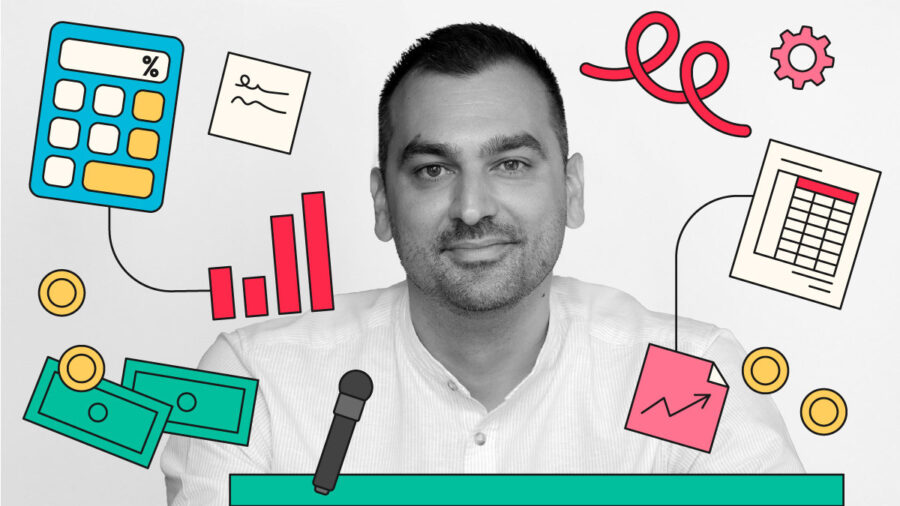
Having studied finance and economics, Konstantin Dzhengozov took the decision that many ambitious young graduates do upon leaving university: he joined the big four. At KPMG in his home country of Bulgaria, Dzhengozov gained a broad range of experience in the consultancy’s corporate finance division, from the technicalities of mergers and acquisitions to the nuts and bolts of running a company: business plans, feasibility and market studies.
He took this experience, plus a natural curiosity, from the consultancy world to the tech sector, working his way up until co-founding Payhawk, a spend-management company, in 2018. “I stepped into the CFO role wanting to manage not only numbers and capital efficiency but also strategy and product,” he says. Here, he shares the skills a great CFO needs, the importance of financial literacy in an organisation and the power of healthy stress.
What skills or traits does a good finance leader need?
Discipline and process are the basics. But curiosity makes the real difference. You need to look beyond your domain, spend time with sales and engineering, understand how products are built and see how other teams work. That perspective helps you make better budgeting and forecasting decisions.
Communication is equally important. Finance can seem complex or even boring to some people, but explaining things simply helps everyone understand why decisions are made and builds alignment across the company.
What excites you most about your current role?
I’m excited that I get to shape the future of finance. We are building products for finance teams and the CFO office and we have introduced AI agents that remove repetitive tasks, free up time for strategic work and create transparency across departments. It is fascinating to see technology change how finance teams operate.
What is the biggest challenge you are facing right now?
Delivering more with fewer resources. Everyone wants real-time visibility, faster analytics and endless iterations of business plans. But tools alone do not solve that. There is still a lot of fragmentation and underutilised technology. The real challenge is deciding what is right for your business and when to scale processes.
What single thing would make your job easier?
A stronger culture of financial literacy across the organisation. Too often, people see finance as a black box. If more teams understood the financial implications of their decisions, it would make the job of everyone in finance a lot easier.
What is the best piece of advice you have ever received?
Don’t just manage the numbers. Manage the narrative behind them. If you only look at the figures, you risk missing what is really happening. Understanding the story behind the numbers helps you make better decisions and see the bigger picture.
Which book should every finance leader read at least once?
I will stick with the classics here. I really like Good to Great: Why Some Companies Make the Leap… and Others Don’t by Jim Collins. It is not about finance in particular, but it is about discipline, leadership and how to excel in what you do. It is useful for almost everyone.
What do you do outside of work to protect yourself from burnout?
I have a very busy schedule, and what keeps me going is the adrenaline and, to some extent, the stress that comes with the job. I believe there is a healthy level of stress when you are doing something you truly enjoy. When work is interesting and challenging, you can spend endless hours immersed in it without feeling burned out.
Outside of work, I have two small kids, a four-and-a-half-year-old son and a daughter who just turned two, and spending time with them helps me completely switch off from the office. I also love high-paced sports that help me clear my mind, like tennis and snowboarding. I used to mountain bike a lot, but after a few injuries, I’m not doing that anymore.
What has been your proudest achievement in your current role?
Turning Payhawk into the first unicorn from Bulgaria has been my proudest achievement. It’s not just about the valuation but about starting with something small, facing early challenges and watching it grow into what it is today. Seeing the company reach this milestone and prove that great businesses can come from a small market has been incredibly rewarding. I am also excited about what comes next for our ecosystem, because I believe we will see even more successful companies emerge from this part of the world.
If you were not a CFO, what would you be doing?
I would probably still be involved in the tech ecosystem in one way or another. I would either help other companies deal with their challenges and share what I have learned or I would join another company early on. I really like the entrepreneurial spirit and it drives me every day. Whether or not I wear the CFO hat, it’s something that feels very empowering to me.

Having studied finance and economics, Konstantin Dzhengozov took the decision that many ambitious young graduates do upon leaving university: he joined the big four. At KPMG in his home country of Bulgaria, Dzhengozov gained a broad range of experience in the consultancy’s corporate finance division, from the technicalities of mergers and acquisitions to the nuts and bolts of running a company: business plans, feasibility and market studies.
He took this experience, plus a natural curiosity, from the consultancy world to the tech sector, working his way up until co-founding Payhawk, a spend-management company, in 2018. “I stepped into the CFO role wanting to manage not only numbers and capital efficiency but also strategy and product,” he says. Here, he shares the skills a great CFO needs, the importance of financial literacy in an organisation and the power of healthy stress.





